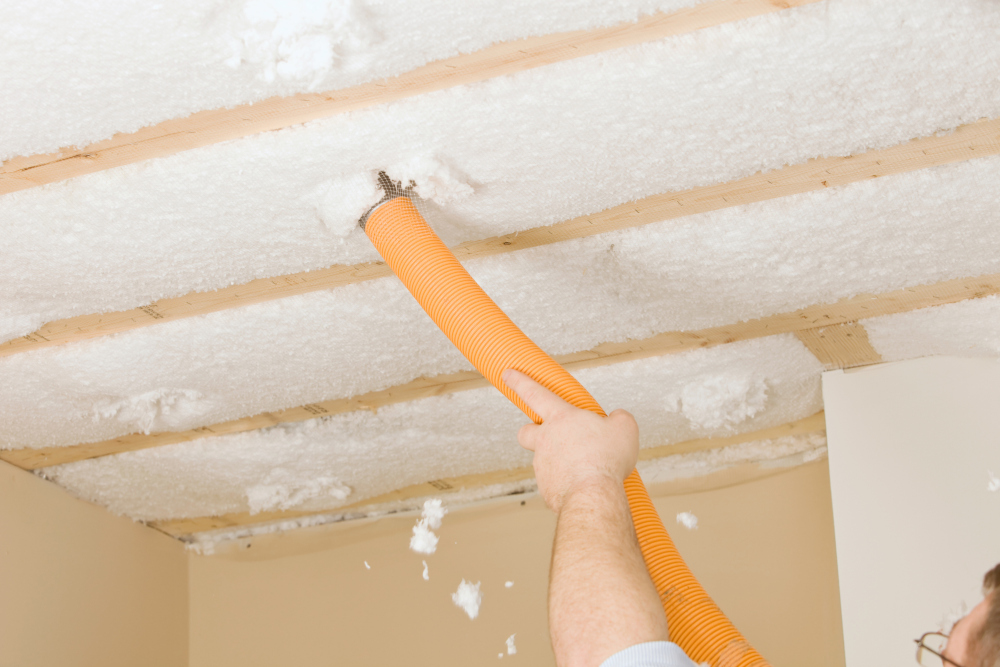
06 Sep How to Insulate Basement Walls
When it comes to making your home more energy-efficient and comfortable, understanding how to insulate basement walls is a crucial step.
Many homeowners often overlook the basement when it comes to insulation, but doing so can lead to heat loss, moisture problems, and higher energy bills.
How to Insulate Basement Ceiling
Before delving into insulating the walls, it’s important to consider how to insulate basement ceiling. Heat can escape through the ceiling, so insulating it is essential for maintaining a comfortable temperature in your basement.
- Selecting the Right Insulation: To insulate the ceiling, you can use fibreglass or foam board insulation. Fiberglass batts are a cost-effective choice and can be installed between ceiling joists. Alternatively, foam board insulation provides better thermal resistance and is suitable for both DIYers and professionals.
- Sealing Gaps: Ensure there are no gaps or cracks in the ceiling where air can escape. Use caulk or foam sealant to seal any openings.
- Vapour Barrier: Installing a vapour barrier on the warm side of the insulation helps prevent moisture from entering the basement. This is particularly important in regions with high humidity levels.
- Professional Assistance: If insulating the ceiling seems complex, don’t hesitate to seek professional help. A well-insulated ceiling is crucial for keeping the heat in your basement.
Keeping the Heat In
Once you’ve taken care of the ceiling, it’s time to focus on insulating the basement walls. Proper insulation will help you maintain a comfortable temperature and reduce energy costs.
Assess Your Basement
Before you start, assess the condition of your basement walls. Check for any signs of moisture or water intrusion. Address any existing issues before proceeding with insulation.
Choose the Right Insulation
Your choice of insulation material depends on your budget, climate, and personal preferences.
Common options include fibreglass batts, foam board, spray foam, and rigid foam. Each has its advantages and disadvantages, so research and choose wisely.
Prepare the Surface
Clean the walls thoroughly and repair any cracks or holes. A clean, dry surface ensures that the insulation adheres properly.
Install Insulation
Fiberglass batts can be installed between the wall studs, while foam board insulation is attached directly to the walls. Ensure a snug fit to maximize insulation efficiency.
Vapour Barrier
Similar to the ceiling, consider adding a vapour barrier on the warm side of the insulation. This helps prevent moisture from seeping into the walls.
Fire Safety
If using foam insulation, be aware of its flammability. Check local building codes for fire safety requirements and use fire-rated materials when necessary.
Electrical Outlets and Pipes
When insulating, pay special attention to electrical outlets and pipes. Cut the insulation to fit around them, and use foam gaskets to seal gaps.
Finishing
Once the insulation is in place, you can finish the basement walls as desired. This might involve drywall, panelling, or another surface material.
Keep in mind that unfinished basement walls can be painted or covered with vapour-permeable materials if you prefer an industrial look.
Things to Remember Before Starting
Before you embark on insulating your basement walls, address any existing moisture problems, such as leaks or seepage, before insulating. Moisture can undermine the effectiveness of insulation and lead to mould growth. Next, check with your local building department to understand any specific requirements or permits needed for basement insulation.
Remember to always wear proper safety gear, including gloves, a mask, and eye protection, when working with insulation materials. Ventilate the area to minimize exposure to fumes and dust, and consider the long-term benefits of energy efficiency – while insulating your basement may require an initial investment, it will lead to lower energy bills and increased home comfort over time.
What Kind of Insulation is Best for Basement Walls?
Selecting the right insulation for your basement walls depends on various factors, including your budget, climate, and personal preferences.
- Fiberglass Batts: These are cost-effective and widely available. They can be installed between wall studs and are suitable for DIY projects. However, proper installation is crucial to avoid gaps.
- Foam Board Insulation: Provides excellent thermal resistance and is relatively easy to install. It’s available in various thicknesses and R-values. Foam board is a good choice for both DIYers and professionals.
- Spray Foam Insulation: Offers superior insulation properties and can seal gaps effectively. However, it’s best left to professionals due to its application complexity.
- Rigid Foam Insulation: Comes in sheets and offers high R-values. It’s resistant to moisture and can be attached directly to the walls.
- Mineral Wool: This insulation is fire-resistant and moisture-resistant, making it a good choice for basements. It also has excellent soundproofing properties.
- Cellulose Insulation: Made from recycled paper, cellulose insulation is eco-friendly and can be blown into wall cavities. It provides good thermal performance but may not be ideal for damp basements.
- Closed-Cell vs. Open-Cell Spray Foam: If choosing spray foam, decide between closed-cell and open-cell varieties. Closed-cell foam is denser and provides a higher R-value, but is more expensive.
Do Basement Walls Need to Be Insulated?
Basement wall insulation is not mandatory, but it offers several benefits. Insulated walls reduce heat loss, leading to lower energy bills. In addition, a well-insulated basement is more comfortable for living and recreational spaces.
Insulation can also help prevent moisture issues, which can lead to mould and structural damage, and insulated walls reduce noise transmission from outside or between floors. Additionally, an insulated basement can be a selling point if you decide to put your home on the market.
What is the Best Insulation for Concrete Walls?
Concrete basement walls present a unique challenge due to their susceptibility to moisture. When considering how to insulate a basement wall, the best insulation for concrete walls depends on your specific circumstances:
- Rigid Foam: Extruded or expanded polystyrene rigid foam insulation is a top choice for concrete walls. It’s moisture-resistant and provides excellent insulation.
- Spray Foam: Closed-cell spray foam is an effective option for concrete walls, as it seals gaps and provides a moisture barrier.
- Mineral Wool: This insulation can handle moisture and offers good thermal performance, making it suitable for concrete walls.
- Vapour Barriers: Always consider adding a vapour barrier when insulating concrete walls to prevent moisture infiltration.
At the end of the day, learning how to insulate basement walls in Ontario is a smart investment that can lead to energy savings, increased home comfort, and a more functional living space.
If you’re searching for a partner you can trust on your basement insulation journey, don’t hesitate to contact our team at Penguin Basements. With our expertise in basement finishing and insulation, we can help you transform your basement into a cozy, energy-efficient space.
For expert basement insulation and finishing services, contact us at Penguin Basements today, and let us help you with all your questions surrounding how to insulate a basement, allowing you to create a comfortable and energy-efficient basement space that you and your family will love.
Christian Saunders, a seasoned marketing professional hailing from Toronto, Ontario, brings over 5 years of valuable experience to our team.
As a key member of our company, Christian plays a pivotal role in crafting compelling content that you encounter on our website and social media platforms. With a keen eye for detail and a passion for effective communication, Christian ensures that our brand's message resonates with our target audience. Beyond his desk, you might spot Christian on our job sites, skillfully capturing multimedia to enhance our visual storytelling.
Don't hesitate to say hello when you see him in action! Christian's dedication and expertise contribute significantly to our mission of delivering exceptional experiences to our valued clients.




